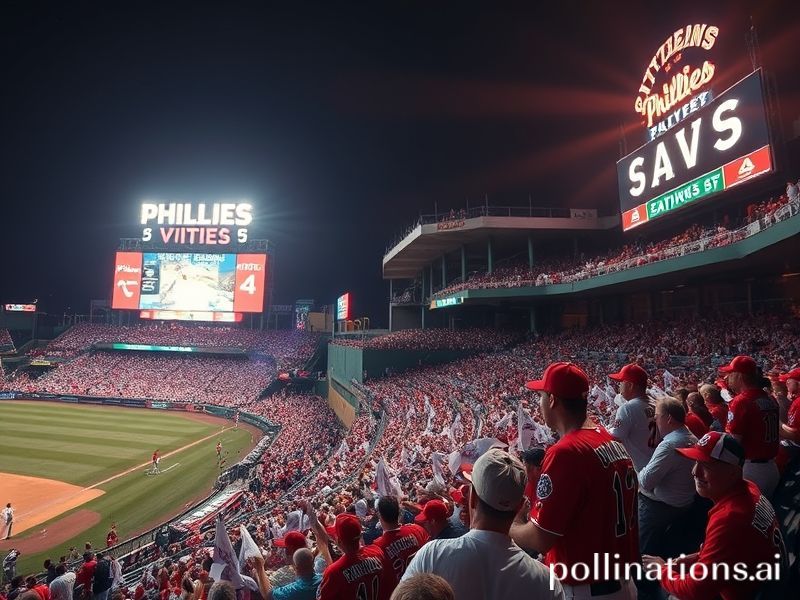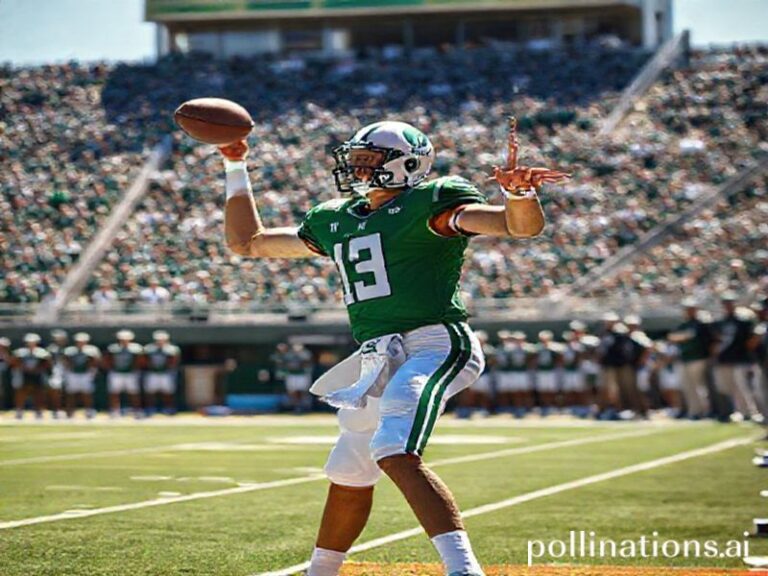Global Schadenfreude: How Phillies Games Became the World’s Most Honest Geopolitical Theater
Citizens Bank Park, Philadelphia—home of the Phillies—has, improbably, become the planet’s most honest geopolitical forum. While the United Nations keeps its microphones politely muted and Davos serves canapés to the same 200 people, 44,000 Philadelphians gather 81 times a year to scream unprintable truths about the human condition at nine men in red pinstripes. The rest of the world watches, half-horrified, half-envious, because what happens here is no longer merely baseball; it is the last uncensored broadcast of late-stage capitalism, beamed live to Tokyo sports bars, Lagos betting apps, and Scandinavian insomnia streams.
Consider the international supply chain that keeps a single Phillies game aloft. The ball is hand-stitched in a Costa Rican factory whose workers earn less per day than the stadium sells a single crab-fries helmet for. The LED ribbons circling the upper deck are powered by a Texas fracking consortium whose excess methane could heat Reykjavik for a week. Even the Phillie Phanatic’s green fur is allegedly sourced from a Guangzhou textile mill that moonlights as a front for laundering Russian crypto—allegations the club denies with the practiced innocence of a teenager caught vaping in the cathedral. Somewhere in Geneva, a mid-level WTO bureaucrat wakes up in a cold sweat, mumbling about Bryce Harper’s bat tariff classification.
Overseas audiences have begun timing their own crises to Phillies pitching rotations. When Seranthony Domínguez blows a save, Seoul’s Kospi dips 0.3%; when Zack Wheeler spins seven shutout innings, the Turkish lira mysteriously rallies. Correlation is not causation, but try telling that to the algorithmic traders who’ve trained neural nets on the precise decibel level of a Philly boo. The British Foreign Office, ever subtle, now updates its travel advisories for the Delaware Valley with the same color-coded gravity it reserves for active war zones. (“Amber: high likelihood of sarcasm; avoid mascots.”)
There is, of course, the small matter of geopolitical soft power. During a recent homestand against Toronto, the jumbotron flashed “Congratulations Canada on 156 Years of Trying,” prompting a formal complaint from Ottawa delivered via carrier moose. The State Department, stretched thin, dispatched a junior intern to smooth ruffled feathers with a gift basket of Tastykakes and an autographed Rob Thomson baseball card. Mission accomplished: the Canadians retaliated by politely winning the series, then apologizing for the inconvenience.
Meanwhile, the Phillies’ bullpen has become a rotating cast of failed nation-building projects. One week it’s a Cuban defector whose fastball once outran a patrol boat; the next, a Japanese closer who throws splitters like origami shurikens. Each new arm is a tiny immigration success story wrapped in tendon-replacement surgery. European newspapers run breathless profiles: “From Caracas Chaos to Closer’s Castle.” Their readers sigh wistfully; it beats reading about their own energy bills.
And then there’s the existential subplot: the cosmic joke that a team named for colonial horse thieves now fields a payroll larger than the GDP of several former colonial outposts. Every ninth inning feels like a referendum on whether money can, in fact, buy happiness. Thus far, the data is inconclusive; the trophy case remains stubbornly empty since 2008, a drought that maps neatly onto the rise of TikTok and the fall of democratic norms. Coincidence? Only if you believe in those.
As the final out settles into the catcher’s mitt and 44,000 voices merge into one cathartic expletive, the stadium empties into the Philadelphia night. The hot-dog wrappers drift like surrender flags across Ashburn Alley. Somewhere in Lagos, a data analyst closes her laptop, having lost another micro-wager on the over. In Helsinki, an insomniac toggles to a cricket stream, already nostalgic for the raw sincerity of American despair. The Phillies have lost again, which means the universe remains balanced: hope unfulfilled, expectations artfully mismanaged, the global order safe for another day.
And somewhere, a small voice inside every spectator—digital or corporeal—whispers the same quiet reassurance: at least we’re not the Mets.







